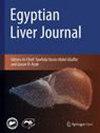Generic sofosbuvir and daclatasvir for treatment of hepatitis C virus infection in patients with sickle cell disease
IF 0.7
Q4 GASTROENTEROLOGY & HEPATOLOGY
引用次数: 0
Abstract
Sickle cell disease (SCD) patients are at a high risk of chronic liver disease (CLD) due to chronic viral hepatitis infection such as hepatitis C virus (HCV) infection, iron overload, and sickle cell hepatopathy. Nowadays, several oral direct-acting antiviral drugs (DAAs) have been developed and approved by the FDA for hepatitis C treatment. However, the safety and efficacy of DAAs in SCD patients remain insufficiently explored. To evaluate the efficacy and safety of administration of generic sofosbuvir (SOF) and daclatasvir (DCV) for 12 weeks in SCD patients infected with HCV. A retrospective study included 38 SCD patients infected with HCV treated with generic SOF (400 mg) and DCV (60 mg) for 12 weeks without ribavirin. The effectiveness of the HCV treatment was assessed by the sustained virologic response (SVR) at 24 weeks after the end of the treatment (SVR24). The SVR24 rate was 100% (38/38).There were insignificant alterations in hemoglobin and total bilirubin levels during HCV treatment or at end of treatment (EOT). The number of anemic patients who needed blood transfusion two weeks before HCV treatment, at week 4 of treatment, and at EOT was 11 (28.9%), 3 (8%), and 1 (3%) respectively. Moreover, the reductions in serum transaminase levels from baseline were statistically significant compared to the EOT. Generic SOF and DCV regimens appear to be safe and effective in the treatment of chronic HCV in patients with SCD.治疗镰状细胞病患者丙型肝炎病毒感染的通用索非布韦和达克拉他韦
镰状细胞病(SCD)患者因慢性病毒性肝炎感染(如丙型肝炎病毒(HCV)感染)、铁超载和镰状细胞肝病而罹患慢性肝病(CLD)的风险很高。如今,已有多种口服直接作用抗病毒药物(DAAs)被开发出来并获得美国食品及药物管理局(FDA)批准用于治疗丙型肝炎。然而,DAAs 在 SCD 患者中的安全性和疗效仍未得到充分探讨。目的是评估在感染 HCV 的 SCD 患者中使用索非布韦(SOF)和达卡他韦(DCV)仿制药 12 周的疗效和安全性。一项回顾性研究纳入了38名感染HCV的SCD患者,他们在不服用利巴韦林的情况下接受了为期12周的普通索非布韦(SOF,400毫克)和达克拉他韦(DCV,60毫克)治疗。HCV治疗效果通过治疗结束后24周的持续病毒学应答(SVR)(SVR24)进行评估。SVR24率为100%(38/38)。在HCV治疗期间或治疗结束(EOT)时,血红蛋白和总胆红素水平均无明显变化。在 HCV 治疗前两周、治疗第 4 周和治疗结束时需要输血的贫血患者人数分别为 11 人(28.9%)、3 人(8%)和 1 人(3%)。此外,与 EOT 相比,血清转氨酶水平从基线开始的下降具有统计学意义。通用 SOF 和 DCV 方案在治疗 SCD 患者的慢性 HCV 方面似乎安全有效。
本文章由计算机程序翻译,如有差异,请以英文原文为准。
求助全文
约1分钟内获得全文
求助全文

 求助内容:
求助内容: 应助结果提醒方式:
应助结果提醒方式:


